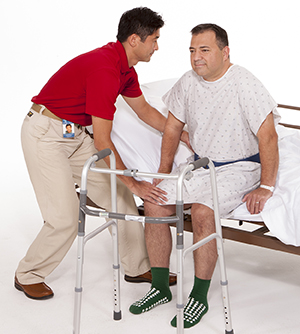After surgery, you’ll be moved to the PACU (postanesthesia care unit). This is often called the recovery room. You’ll stay there until you’re fully awake and stable—often a few hours. Then you’ll be moved to your hospital room.
Right after surgery
After surgery, you may feel groggy, thirsty, or cold. Your throat may be sore. For a few days, you may also have:
-
An IV (intravenous) line to give you fluids and medicine.
-
A tube (catheter) to drain urine from your bladder.
-
Tubes to drain your incision.
-
Boots or special compression stockings on your legs. These help prevent blood clots.
Pain control after surgery
You will likely have pain after surgery. To help you feel better, your nurse will give you pain medicine. You may also have a pump that lets you give yourself pain medicine. Even with medicine, some pain is normal. But tell your nurse if you are very uncomfortable. Be aware that some pain medicines can cause confusion or disorientation for a time. They can also cause constipation.
Starting hospital rehabilitation
Soon after surgery, a physical therapist will begin teaching you basic exercises. You’ll also learn how to protect your hip while it heals. Even though you’ll have help, much of the work is up to you. So try to walk and move around as much as you safely can. It may seem hard at first. But it’s the best thing you can do for your recovery. The more active you are, the sooner you’ll be prepared to go home. Your healthcare provider may restrict weight-bearing activities after your surgery. This will depend on the type of fracture and surgery that you had.
Featured in


